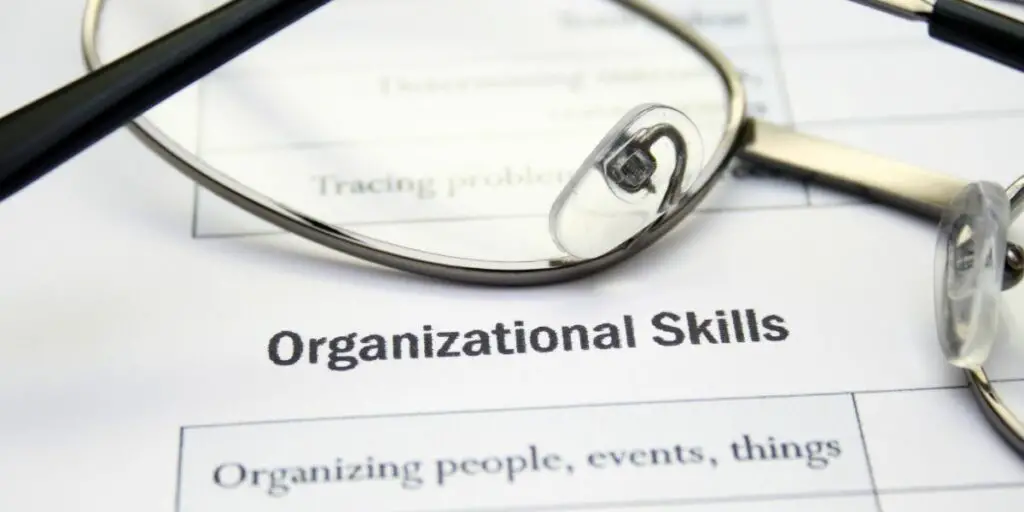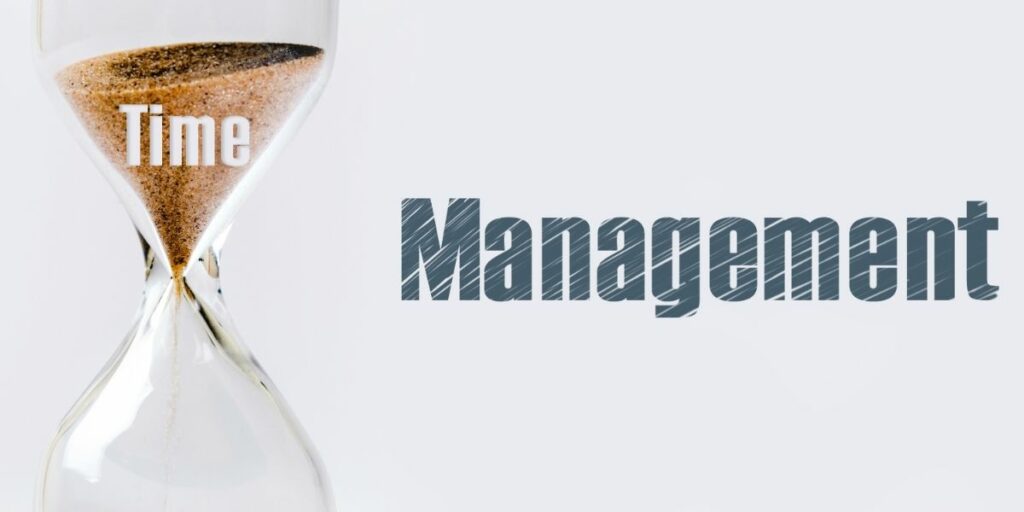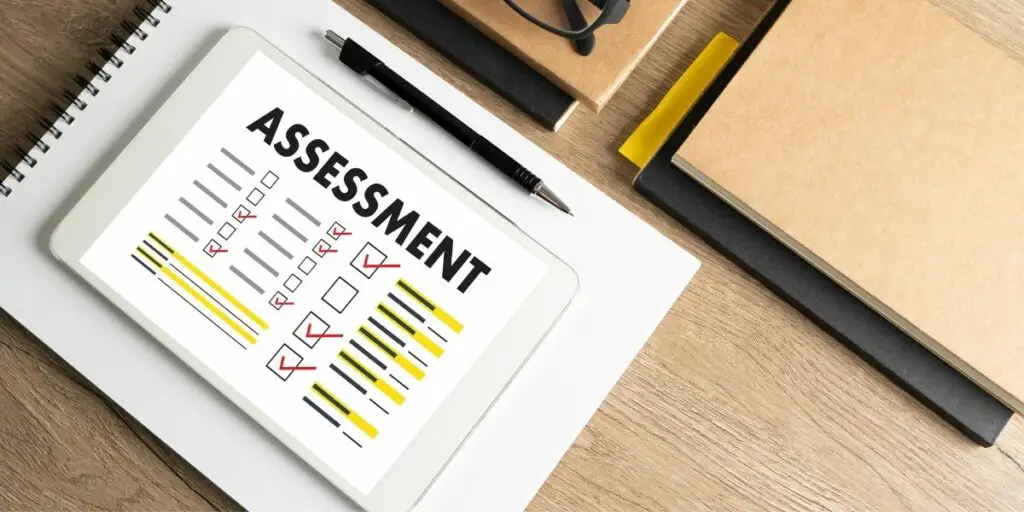Disclaimer: We sometimes use affiliate links in our content. For more information, visit our Disclaimer Page.
To be successful in the workplace, it is essential to have strong organizational skills. This means keeping track of multiple tasks simultaneously and completing them on time.
It can be challenging to develop these skills, but you can be on your way to becoming an organizational genius with a bit of practice! This blog post will discuss 15 examples of organizational skills that will help you get ahead at work.
What are Organizational Skills?

Organizational skills are a critical component of success in any field or endeavor. They encompass the ability to create structure and order, boost productivity, and prioritize tasks that must be completed immediately. These skills are essential for students who want to excel in school and reach their academic goals. In addition, organizing one’s thoughts and materials can make studying more efficient and effective and lead to better grades.
Also crucial in the workplace. Employees who can efficiently manage their time and resources are typically more productive and successful than those who cannot. Good organization can help prevent missed deadlines, lost opportunities, and unmet goals. There are many different ways to develop and improve organizational skills. Some people are naturally more organized than others, but anyone can learn these skills with practice.
Why are Organizational Skills important?
There are many reasons why having strong organizational skills is essential. As we mentioned before, managing time and resources efficiently can lead to increased productivity at work. This can, in turn, lead to promotions, raises, and other opportunities for career advancement. Besides, a good organization can help reduce stress levels at work and home.
When everything is in its place, and you have a plan for completing tasks, it is much easier to relax and enjoy your free time. Finally, good organizational skills can help you live a healthier lifestyle. People who are organized tend to eat better, exercise more regularly, and get more sleep. All of these factors contribute to a longer, happier life.
15 Examples of organizational skills
Here are 15 examples of organizational skills that can help you get ahead at work:
1. Time management

This is the ability to plan and schedule a particular task to allow you to complete them within the allotted time. Time management is a critical organizational skill. Those who can manage their time efficiently are typically more productive and successful than those who cannot.
Good time management can help prevent missed deadlines, lost opportunities, and unmet goals. There are many different ways to develop and improve time management skills. Some people are born more organized, but anyone can learn these skills with enough practice.
2. Setting goals
As any successful professional knows, setting goals is essential to achieving success. Without goals, it is too easy to become bogged down in the day-to-day grind and lose sight of what you are working towards.
Yet, setting goals is not simply writing down a to-do list you want to achieve. Your goals must be specific, realistic, and achievable to be effective. Furthermore, they need to be linked to your employer’s objectives.
Only by aligning your personal goals with the wider objectives of your organization can you hope to achieve true success. By taking the time to set well-organized goals, you can ensure that your efforts are focused and directed towards achieving results that benefit both you and your employer.
3. Communication
Organizational communication is the sharing of information between members of an organization. It is a process that helps ensure that everyone in the organization is on the same page, with a shared understanding of its goals, objectives, and procedures. Good organizational communication skills can help to improve employee morale, increase productivity, and build team spirit.
It can also help reduce turnover and absenteeism and improve customer service. There are many different communication channels within an organization, including face-to-face communication, written communication, telephone calls, email, and text messaging. Therefore, it is crucial for managers to be aware of each channel’s different strengths and weaknesses and to use the most appropriate channel for each message.
4. Delegation
Another critical component of an organization is knowing when to delegate. When an employee’s workload becomes too much for them to handle, it can hinder their productivity and hurt the rest of the team. In these cases, it’s essential to delegate some of the tasks to other team members.
But, it’s crucial to delegate wisely. Make sure to assign tasks to the team member who is most qualified to handle them. This will help ensure that the task is completed efficiently and effectively. By taking the time to delegate properly, you can help improve the productivity of your entire team.
5. Working Under Pressure

Working under pressure is an important organizational skill for several reasons. First, it allows employees to meet deadlines and achieve goals. Second, it helps organizations to function smoothly and efficiently. Third, it builds teamwork and cooperation among employees. Finally, it fosters creativity and innovation.
Pressure can be a positive force if it is appropriately managed. It can motivate employees to perform at their best and help organizations achieve their goals. However, pressure can lead to stress and conflict if not handled properly. Managers need to know how to manage pressure not to become an opposing force in the workplace.
6. Self-motivation
It is an important organizational skill because it allows employees to stay focused and motivated even when no one else is around to encourage them. It is a crucial ingredient for success in any field.
Self-motivated employees can set their own goals and work towards them without constant supervision. They can also take the initiative and solve problems on their own. Overall, self-motivated employees can stay positive and motivated even in adversity.
7. Analytical thinking
Analytical thinking is the ability to think logically and critically about a problem or issue. It involves breaking down a problem into smaller parts to be better understood. It also consists in identifying the relationships between different ideas and concepts.
There are many other reasons that analytical thinking is an essential organizational skill, but these three illustrate why it is so valuable. First, by identifying problems and potential solutions quickly, organizations can avoid unnecessary costs and improve the quality of their decisions.
Therefore, all managers and decision-makers must develop strong analytical thinking skills.
8. Public speaking
Public speaking is another important organizational skill. It allows managers to communicate effectively with large groups of people. Good public speakers can communicate clearly and concisely. They are also able to engage and inspire their audience.
Public speaking can build relationships, generate new ideas, and promote understanding. Additionally, public speaking can also be used to build trust and credibility.
If you want to be a successful leader, you need to communicate effectively with your team. You also need to be able to inspire them and build relationships. By honing your public speaking skills, you will be able to do all of these things.
Related: Overcome Communication Apprehension
9. Documentation
Documentation is an organizational skill that allows managers to keep track of tasks, procedures, and goals. Good documentation can help managers plan and execute projects more effectively. It can also help managers troubleshoot problems and track progress.
It is especially important in fast-paced and rapidly changing organizations. By keeping accurate and up-to-date records, managers can make better decisions and avoid costly mistakes.
In today’s business world, documentation is more important than ever. With the right tools and processes in place, you can streamline your workflow and improve your organization’s efficiency.
10. Attention to detail

Being organized on the job means more than just being able to find your stapler when you need it. It’s about taking the time to do things right the first time so that you don’t have to go back and fix them later. It’s about being mindful of the details and ensuring that every aspect of a task is handled correctly.
It’s about having the time and energy to correctly complete each step of a project. Attention to detail is an essential organizational skill, and it can make a big difference in your career.
If you’re able to stay focused and attentive, you’ll be more likely to succeed in your work. So pay attention to the details, and stay organized on the job. It’ll pay off in the long run.
11. Decision-making
Being a good decision-maker is a vital skill in the workplace. Employers want employees who can think logically and consider the potential desired outcome of their decisions before taking action. Good decision-makers are also good communicators and can effectively gather the necessary information before making a choice.
They are also goal-oriented and able to weigh the pros and cons of each option to choose the best course of action. If you are skilled in organization, you likely have the skill set necessary for making effective decisions. This makes you an asset to any workplace and gives you a competitive edge in the job market.
12. Multitasking
With the ability to juggle multiple tasks at once, you can take on more responsibility at work and get more done in less time. Multitasking is an important organizational skill that can help you advance your career.
When you’re able to multitask, you can accomplish more in a shorter amount of time. This makes you more productive and efficient, both on the job and in your personal life. If you’re looking to get ahead, learning to multitask is a great place to start.
13. Strategic planning
From managing a hectic work schedule to taking care of a busy household, there are always a million things to do, and only 24 hours a day. One of the best ways to make the most of your time and energy is strategic planning. This involves keeping a detailed calendar of upcoming events, using a focus timer to stay on task, and scheduling meetings days or weeks in advance.
By thinking ahead and planning accordingly, you can stay on top of your workload and avoid missing deadlines. Being organized can help you save time, money, and stress. So next time you’re feeling overwhelmed, remember that a bit of planning can go a long way.
14. Listening skills
Listening skills are critical organizational skills because they help ensure clear communication within a company. Good listening skills can help prevent misunderstandings and miscommunications and help build better relationships between employees and managers.
Additionally, effective listening can increase productivity and efficiency in the workplace. When employees feel like their voices are being heard and valued, they are more likely to be motivated and engaged in their work.
There are several ways to improve listening skills. One is to pay attention and try to understand the speaker’s message. It is also essential to ask questions and seek clarification when needed. Additionally, it can be helpful to repeat back what the speaker has said to ensure that you correctly understand the message.
Developing strong listening skills can take time and practice, but it is worth the effort. Doing so can help improve communication and relationships in the workplace and lead to overall success.
15. Assessment and evaluation

There are many reasons why assessment and evaluation are important organizational skills. First, they help ensure that employees meet their job requirements and performance expectations. Additionally, assessment and evaluation can identify areas where employees need improvement, which can be addressed through training or other interventions.
Furthermore, these activities can provide valuable feedback to employees regarding their progress and performance. Finally, assessment and evaluation can help identify potential issues or problems within the organization that may need to be addressed.
Related: List of Skills for Resume
How do you improve organizational skills?
You can do a few key things to improve your organisational skills. First, keep a planner and use it religiously. Write down everything you need to do in one place, so you don’t have to waste time searching for misplaced notes.
Second, set aside time each week to organize your space. This will help you track what you have and where it is. Third, create a filing system that works for you. This can be anything from a simple notebook with dividers to an electronic system on your computer.
Fourth, label everything. This will help you find things more quickly and put them back in the right place when you’re finished with them. Finally, don’t procrastinate. Excellent Organizational skills are all about being proactive and taking care of things before they become a problem. If you wait until the last minute to do something, you’ll always play catch-up.
Related: Examples of Interpersonal Skills
Final Thoughts
Do any of these organizational skills stand out to you? If you’re in the market for a new job or just want to spruce up your resume, add some of these examples of organizational skills to your list.
Organizational skills are essential for success in any career. By taking the time to develop and hone these skills, you can set yourself up for success. Use the tips above to start improving your organizational skills today.
And if you have other tips that have worked well for you, we would love to hear about them in the comments below.
FAQs
Why are organizational skills important in leadership?
Organizational skills are essential in leadership because they help leaders to plan, coordinate and implement activities effectively. Good organizational skills enable leaders to make better decisions, delegate tasks efficiently, and communicate clearly with their team. Furthermore, the most important organizational skills help leaders keep track of progress, identify problems early, and maintain control over their work environment.
How do you answer the organizational skills interview question?
It’s crucial to demonstrate your organizational skills in an interview setting. Here are some tips on how to do just that:
– Give specific examples of times when you’ve utilized your organizational skills. This could be from past jobs, projects you’ve undertaken, or even everyday life situations.
– Describe the methods you use to stay organized. This could include using a planner or calendar to track tasks with specific software applications.
– Explain how your organizational skills have helped you succeed in the past. This could be in completing tasks efficiently, meeting deadlines, or staying on top of important details.
– Share what you enjoy about being organized. This can help show that you’re good at staying organized and that you enjoy it as well!
By following these tips, you’ll be able to communicate your organizational skills in an interview setting effectively.
What is the difference between Planning & Organizing?
Planning skills decide what needs to be done, when it should be done, and who will do it. It’s a road map for what actions need to be taken to achieve specific goals. Organizing is putting the plan into action by allocating resources and assigning tasks.
What comes first, organizing or planning?
If you’re wondering whether organizing or planning comes first, the answer is planning. Before you can effectively create a structure that ensures the right results, you need to set the right priorities. Then, once you have a plan in place, you can start organizing your thoughts and materials to support your goals.
Can organizing be done without planning?
Organizing and planning are two critical skills that go hand in hand. It would be nearly impossible to get anything done without proper planning – everything would be a chaotic mess. But, on the other hand, organizing helps us take the plans we’ve made and put them into action. So, can organizing be done without planning? In short, no. The two skills are intertwined and necessary for each other. One cannot exist without the other.
What is the physical organization?
The physical organization is the process of grouping physical resources together to make sense for your company. This can include anything from office layout to supply chain management. It is essential because it can help improve efficiency, communication, and safety within your company. It can also help you respond better to emergencies and disasters.
What are mental organizational skills?
There are many different types of mental organization skills, but they all share one common goal: to help you think more clearly and effectively. Mental organizational skills can help you in various situations, from researching and analyzing data to preparing documentation or thinking strategically.





